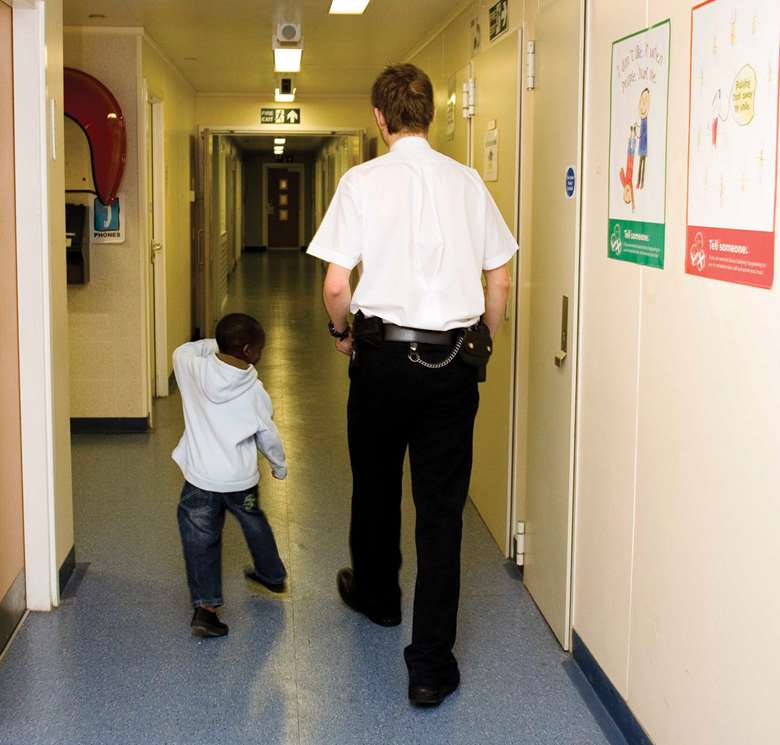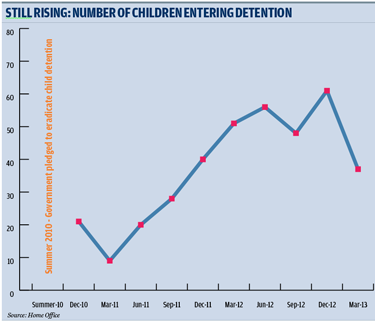Government is falling short on pledge to end child detention
Neil Puffett
Monday, June 10, 2013
Analysis of data suggests that the coalition's promise to end detention of asylum-seeking children has been reneged, and that significant numbers are suffering both physical and psychological distress.

Described in 2010 by Deputy Prime Minister Nick Clegg as a “shameful practice”, the ending of child detention in immigration cases was a key pledge of the coalition government when it came to power.
But latest statistics show that rather than being abolished, the use of child detention has actually increased in the two years since a new case management system, meant to be the mechanism for delivering the pledge, came into effect in May 2011.
In the months prior to the ban being introduced, the use of child detention dropped significantly, with only nine children detained in the four months between November 2010 and February 2011. But since then the figures have risen steadily.
In 2011/12, 139 children were detained. And latest Home Office figures reveal that this was surpassed in 2012/13, with a total of 202 children detained – an increase of 45.3 per cent (see graph).
The figures appear to undermine the validity of the pledge. So can the government legitimately say it has ended child detention?
Under the new process for returning families, those who refuse to leave are referred to the Independent Family Returns Panel, which scrutinises UK Border Agency plans for their removal. As a “last resort”, they can be kept in “family-friendly” pre-departure accommodation – the Cedars centre near Crawley, West Sussex, where Barnardo’s provides welfare and social care services – immediately prior to leaving the country, usually for a period not exceeding 72 hours.
The government says these changes to the system are evidence that the pledge is being met.
But Judith Dennis, policy officer at the Refugee Council, says it is being disingenuous in its claim. “The government is misrepresenting the situation,” she says. “Just because it is called pre-departure accommodation does not mean it is not detention. But what they have said about it means the public have stopped worrying and thinking about it.”
Dennis adds that the case management process is not always used as a means of last resort. She points to a report by the Independent Family Returns Panel, published in September 2012, which reveals that 77 of the 186 families referred to the panel in the space of 13 months were later granted leave to remain in the UK.
She says this indicates that the system is not being used as a last resort, and that families with legitimate claims to remain in the UK are being detained.
Unfulfilled promise
Kamena Dorling, policy and programmes manager at Coram Children’s Legal Centre, says the numbers being detained do not represent the “tiny number of cases” promised by Clegg in 2010.
“The Liberal Democrats frequently refer to ending child detention as a promise fulfilled, yet the numbers are creeping up,” she says.
“If you are talking about 200 children a year being detained, that still represents approximately a fifth of the numbers there were prior to the coalition pledge. It is still clearly an issue.”
It is also apparent that the process for returning families is not the only mechanism used to detain children. Dorling points to the fact that the quarterly detention figures retrospectively feature children who were previously believed to be adults but have been wrongly age-assessed.
Home Office statistics show that 46 children were detained as adults in this way in 2011, and 13 in 2012. Due to the fact that they were believed to be adults, the 72-hour restriction for how long they can be held did not apply.
“We are repeatedly seeing Home Office and local authority social workers disbelieving children about how old they are,” Dorling says.
“Assessments are often done inadequately or on sight. If they think someone looks 18, they will treat them as an adult.
“It is clearly a fundamentally flawed system.”
There are also numerous cases of child detention that do not appear in official statistics. A freedom of information request by the Children’s Society found that in just four months between May and August 2011, 697 children were detained entering the country. The government does not routinely publish statistics on the scale of detention of children entering the country.
Although the issue of child detention and the use of pre-departure accommodation are highly controversial, numbers of children detained at Cedars could conceivably increase in the future.
Cedar’s benefits
Chris Spencer, chair of the Independent Family Returns Panel and former director of children’s services for Hillingdon, says the conditions at Cedars can be beneficial for the welfare of children leaving the country. He would like to see it used more.
“People need to understand that Cedars is a very different institution to what Yarls Wood [the widely criticised immigration removal centre] was,” he says. “It is there to help support the family in adjusting and coming to terms with the fact that they are having to return against their will.
“It gives them an opportunity to deal with unresolved issues, such as making contact with extended family members, and parents are helped in supporting their children with the changes in their life circumstances that will take place. It is a very positive environment.”
Spencer’s view is backed by a Prisons Inspectorate report, which found that despite force being used in relation to six of the first 39 families to be detained there, including a pregnant woman, Cedars offered “exceptional care”.
“If anything, I think that more families would benefit from their return being through Cedars because they get an awful lot of support,” Spencer says.
“Anecdotally, families going through the process report that it is a very positive experience on the whole.
“The flipside to this is that although it is a positive environment, it is still detention and the government has committed to reducing detention of children.
“But it can be more attractive than the alternative in some situations.
“A fairly significant minority of families are choosing to abscond in order to avoid removal. My concern is that children living ‘below the radar’ may not be in school and not have access to health services.
“You could argue that it is in the best interests of those children to spend that time at Cedars.”
Expert view
Emma Mlotshwa, co-ordinator of Medical Justice
"These worrying figures show us that the coalition pledge to end child detention remains unfulfilled, three years after it was first made. Indeed, we fear that the situation could get worse, and are worried that numbers will continue to increase and slide back to the pre-2010 levels of around 1,000 children a year. The statistics make us question whether the government ever had any intention of ending the detention of children. We might still have some faith in the pledge if the numbers were actually going down, but they are travelling in the opposite direction.
"Detention is certainly not a place where children should be. The government must stop the practice, full stop – plain and simple.
"Our research shows that children held in immigration detention are both physically and psychologically harmed. It can result in bed wetting, loss of bowel control and loss of appetite. These children can witness violence against their parents and are often used as pawns in the removal process, being picked up and taken away from their parents to coerce them to do things.
"There have been instances of children being separated from one or both of their parents in the process. The experience can have a huge impact on them.
"The government says it is only a small minority of cases where force is used in detention settings. This being the case, there is no reason why most removals dealt with in this fashion could not take place in the community instead."





